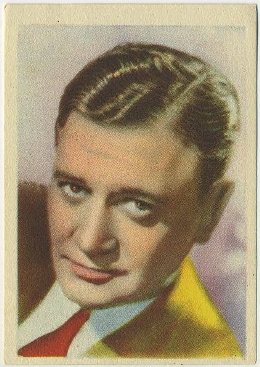 I don’t mean to overstate the quality of RKO’s The Public Defender (1931) by association, but the character Richard Dix plays, Pike Winslow aka “The Reckoner,” not only calls to mind Robin Hood, but sometimes even had me thinking of more modern crime fighters, namely Batman. No CGI or Technicolor here though, nor even any comic book for that matter; just a self-contained little story whose entire legend moves at a speedy clip throughout a sporadically grainy 70 minutes in black-and-white, making The Reckoner my kind of hero.
I don’t mean to overstate the quality of RKO’s The Public Defender (1931) by association, but the character Richard Dix plays, Pike Winslow aka “The Reckoner,” not only calls to mind Robin Hood, but sometimes even had me thinking of more modern crime fighters, namely Batman. No CGI or Technicolor here though, nor even any comic book for that matter; just a self-contained little story whose entire legend moves at a speedy clip throughout a sporadically grainy 70 minutes in black-and-white, making The Reckoner my kind of hero.
Pike shares Bruce Wayne’s wealthy background and comes off as a just as worthless playboy during society functions, but he is secretly the “will o’ the wisp, a phantom shadow,” who, with the assistance of two war buddies, takes the law into his own hands to right society’s wrongs. These vigilantes do not use physical violence to correct injustice, but simply expose the misdeeds of wrongdoers to point blame at its proper place. The Reckoner’s foes within The Public Defender are an especially easy target during the Great Depression, a collection of crooked bank executives.

Above: An ad for The Public Defender found in the October 25, 1931 edition of the Victoria Daily Advocate. The ‘public enemy’ tag is a bit of a stretch since there aren’t any gangsters in this movie. I do like the wolf hovering over the bank though.
Nobody has seen Pike Winslow (Dix) for awhile, but he reemerges to keep a date with Barbara Gerry (Shirley Grey) at a party with guests including those bank officers who have recently ruined her father. Pike excuses himself from Barbara and her aunt (Nella Walker) to say hello to Rose Harmer (Ruth Weston), daughter of one of Gerry’s turncoat associates (Sheridan), and her date, police Inspector Malcolm O’Neill (Alan Roscoe), who Pike bugs throughout to gift him a police badge. When Pike returns to their table Barbara is soon ready to go and they each excuse themselves so they can say good-bye to various guests. Pike pays a visit to the bankers at this time, finding them secluded away from the other guests and in no mood for any pointless banter. “We can’t all of us do nothing but sit around and live on our Dad’s money,” one of them says to Pike. A cheery Pike tells Harmer that he’ll be around the house next week to visit Rose and Harmer is anything but thrilled.
When the bankers are finally rid of young Pike they demand the waiter serve them some food. A delivery man distracts the waiter in the kitchen just long enough for a note to be slipped under Harmer’s sandwich. After Harmer rudely dispenses with the waiter he lifts half of his sandwich to discover The Reckoner’s calling card:
Their reaction:
It’s the same message Pike had just delivered personally, but nobody of any distinction listens to the ne’er-do-well Pike Winslow anyway, so the dots are not connected by any of the characters in the movie. Any mystery for the viewer about The Reckoner’s identity is revealed when Pike rides home and his driver turns out to be the same man who had posed as delivery man in the kitchen, Doc (Paul Hurst). Waiting at home is The Professor, played by Boris Karloff earlier in the same year that he closed by playing Frankenstein’s monster. Immediately after first seeing this odd trio together, the doorbell rings and Doc and The Professor hide in another room. It’s Frank Wells (Edmund Breese), an old acquaintance of Pike’s presumably through Pike’s father.
Frank provides some background about Pike while at the same time somewhat heavy-handedly hinting that he knows Pike is The Reckoner. Mentioning the way The Reckoner works, Frank suspects he is a young man back from the war, perhaps one who worked in the intelligence service, leaving us to assume this is Pike’s own background. “You know, Frank,” says Pike, “that fellow ought to be on his guard. You’ve got him all figured out.”
It is never spelled out but I assume Doc and The Professor served alongside Pike in the Great War and the three reconnected at home. Doc is the grunt of the group, his main service in running errands and in subduing those who threaten the path of The Reckoner. We later see him pounce upon Harmer’s butler and leave him bound and gagged in the kitchen so Pike can attend to Harmer without interruption from any hired help. Doc is at a loss when Pike and The Professor sit around the dining table exchanging quotes from Keats and Byron, tossing out his own crude poem that gets a laugh from his two pals. While Pike works the inside and Doc helps clear a path for him, The Professor gathers research and information to help set up The Reckoner’s adventures. The extent of their enterprise is on display when Pike asks The Professor to retrieve income tax returns and other information about the three bankers. The Professor draws back a curtain revealing a row of filing cabinets that will fill that request and probably finger many another white collar criminal as well.
While Pike attempts to clear Gerry’s name he also tries to make life better for Gerry’s daughter, Barbara (Grey), who has been in love with him since she was twelve. When the Gerry family goods are auctioned Pike is at Barbara’s side with the Professor planted amongst the bidders taking signals from Pike. I’ve detailed Pike and the Professor’s bidding technique in a previous post looking at the Professor’s Farnesbarnes alias, but those reclaimed goods and the gift of a swank apartment are originally rejected by Barbara’s aunt, Matilda (Nella Walker), who finds Pike every bit as useless as the rest of her generation does, excepting Frank Wells. While Pike flirts some with Rose (Weston), he only does so to get close to her father, Charles Harmer. It’s obvious, except perhaps to Barbara, that Pike is just as much in love with her as she is with him.
 Shirley Grey, who plays Barbara Gerry, is an actress that fans of the period have likely encountered before. She’s best known for appearing with Bela Lugosi in Phantom Ship (1935), but also appeared in titles such as Virtue (1932) with Carole Lombard, The Life of Jimmy Dolan with Douglas Fairbanks, Jr. and Little Giant (both 1933) with Edward G. Robinson, A concise biographical entry by Don Rozanski on the IMDb best serves up Grey’s story. Like a lot of early talkie talent she spent much of the preceding decade on stage before enjoying a Hollywood career that was as busy as it was brief: Shirley Grey appeared in over 45 movies between 1930 and 1935 and never appeared in another film after that later date. In 1934 she told columnist Dan Thomas, “I’ve made 18 pictures during the last year. They have kept me so busy I actually have become sensible. I don’t have time to be any other way.” Grey added, “Gosh, I couldn’t celebrate repeal, and I’ve even stopped smoking.”
Shirley Grey, who plays Barbara Gerry, is an actress that fans of the period have likely encountered before. She’s best known for appearing with Bela Lugosi in Phantom Ship (1935), but also appeared in titles such as Virtue (1932) with Carole Lombard, The Life of Jimmy Dolan with Douglas Fairbanks, Jr. and Little Giant (both 1933) with Edward G. Robinson, A concise biographical entry by Don Rozanski on the IMDb best serves up Grey’s story. Like a lot of early talkie talent she spent much of the preceding decade on stage before enjoying a Hollywood career that was as busy as it was brief: Shirley Grey appeared in over 45 movies between 1930 and 1935 and never appeared in another film after that later date. In 1934 she told columnist Dan Thomas, “I’ve made 18 pictures during the last year. They have kept me so busy I actually have become sensible. I don’t have time to be any other way.” Grey added, “Gosh, I couldn’t celebrate repeal, and I’ve even stopped smoking.”  Thomas mentions that she was in greater demand than any other freelance actress at that moment in time. She left the screen after marrying for a third time in 1936, but a divorce, the death of her son in World War II and her inability to land new acting jobs led to a reclusive life. Shirley Grey died in 1981, age 79. At the time of this film she had recently signed a contract with Samuel Goldwyn, but was immediately loaned to RKO for not only The Public Defender but to co-star in Dix’s next movie, Secret Service (1931), a title that has yet to secure a video release but another Richard Dix movie I will be taking a look at as part of the Snoopathon on June 3.
Thomas mentions that she was in greater demand than any other freelance actress at that moment in time. She left the screen after marrying for a third time in 1936, but a divorce, the death of her son in World War II and her inability to land new acting jobs led to a reclusive life. Shirley Grey died in 1981, age 79. At the time of this film she had recently signed a contract with Samuel Goldwyn, but was immediately loaned to RKO for not only The Public Defender but to co-star in Dix’s next movie, Secret Service (1931), a title that has yet to secure a video release but another Richard Dix movie I will be taking a look at as part of the Snoopathon on June 3.
The Public Defender was the first movie directed by former RKO screenwriter J. Walter Ruben, who would be very active with the studio throughout the remainder of the decade. In addition to The Public Defender and Secret Service, Ruben directed Dix in The Great Jasper, No Marriage Ties and Ace of Aces (all 1933). He scored excellent notices for his debut effort, which most reviews praised on the whole while warning Dix fans that The Public Defender was not another Cimarron. Photoplay reported “Unless you’re looking for another Yancey Cravat, you’ll not be too bored,” while Screenland scolded “Not another Cimarron? Stop it! Dix can’t do an epic every time,” and Film Daily coaxed theater operators by suggesting, “Dix will make new friends in this one.”
Originally titled The Million Dollar Swindle during production, RKO found itself challenged in court when Mayer C. Goldman claimed exclusive ownership of the title The Public Defender based upon a 1917 release of the same name that he had produced. Given the final product I assume RKO came to some type of settlement with Goldman over the title, though I’m left to wonder why they just didn’t call the movie “The Reckoner” instead. That alias of the Dix character sticks in my mind much better than The Public Defender ever will. In fact, the first time I watched I was expecting something set in a courtroom.
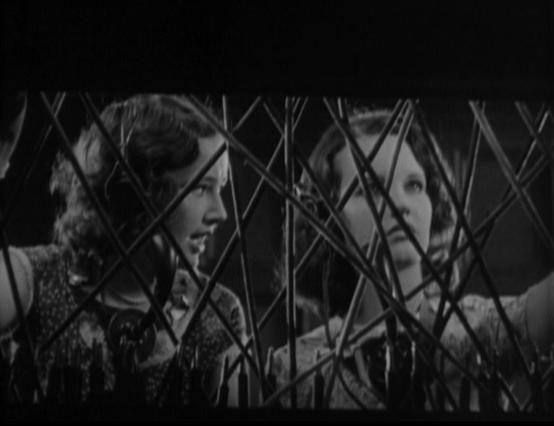
Above: Don’t blink! Rochelle Hudson on the right as a switchboard operator who gets one or two lines in a bit role.
No matter the title, The Public Defender is a better than average offering from the Dix catalog. Likely drawing most of its more recent viewers through Boris Karloff’s inclusion in the cast, the horror icon’s part does play stronger than you might expect based upon the middling billing he received. In fact, beyond Dix, the star this production was built around, and his leading lady, Grey, nobody comes off any better than The Reckoner’s two sidekicks, Karloff as The Professor and the even lower billed Paul Hurst as Doc. Most of the other actors that they are surrounded by are older and somewhat blend together with the exception of a very hot-tempered Purnell Pratt. Oh, and that small bit filled in the beginning by Emmett King, who really is terrible.

Above: Dix in the shadows conjures ideas of The Whistler, years ahead of its time.
The Public Defender was released to theaters about six months after Cimarron, leading to all of those warnings in the reviews. The success of Cimarron had touched off a new wave of popularity for Dix and while he would never star in a movie as major as that again, The Public Defender is another of several smaller, largely forgotten films of good quality that he starred in during this period at RKO. It is worthy of rediscovery by a more general crop of classic movie fans beyond just the Karloff completists, though Boris’ eccentric Professor will likely make that crowd happy too.
Thank you to Warner Archive for providing me with a review copy of The Public Defender, which was recently released as a Made to Order DVD-R that you can order HERE. I am currently in the process writing about all five of the recent Warner Archive releases starring Richard Dix. The Public Defender follows an earlier post about Dix in His Greatest Gamble (1934).
Cited
- Thomas, Dan. “Hollywood Film Gossip.” Pittsburgh Press 12 Feb 1934: 12.

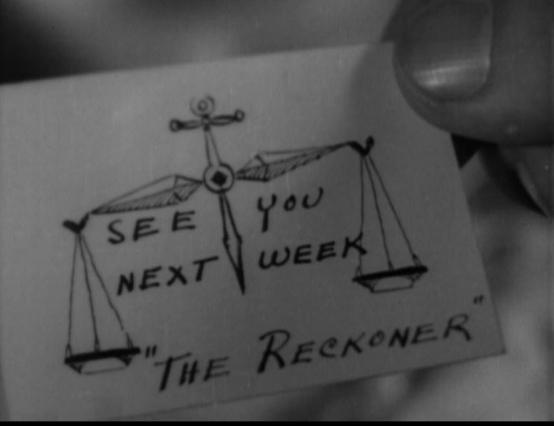

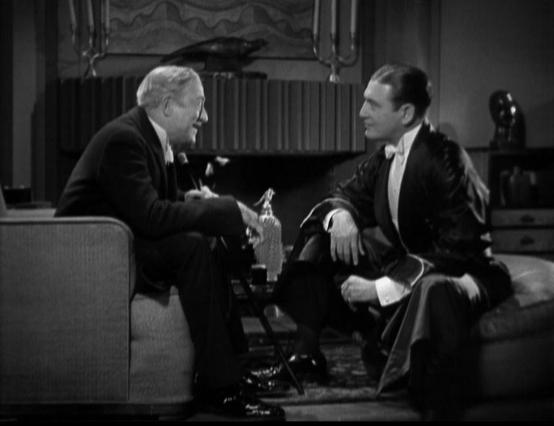

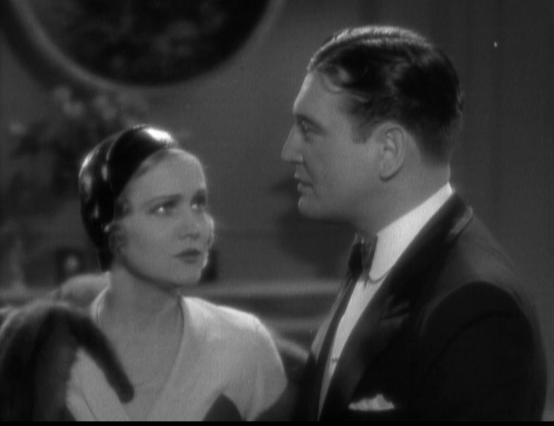



I think this movie on DVD part of Boris Karolff early 1930s collection don’t quote me just seem weird seeing Boris without Monster makeup he was pretty good actor
Hi Kelly, I think this one is only available from Warner Archive — You might be confusing it with The Criminal Code, a good one starring Walter Huston, that’s part of the Karloff: Criminal Kind collection along with The Guilty Generation and Behind the Mask.
Oh, as for his acting, I think Karloff is great most of the time and this one is especially enjoyable because he’s a bit of a goofball. His best scene is probably when he bids at the auction. I’ve noticed I don’t care for him too much when he plays mobsters (I may be prejudiced against British mobsters) and I really can’t stand him as Isopod in Five Star Final, but everyone else seems to love that one.
When I first saw “The Public Defender” I was also struck by
the Batman link – mainly Boris Karloff as “The Professor”. I
wondered whether a young Bob Kane had seen this movie
and based “Alfred” on Karloff’s role.
Diane, I wondered the same thing about Kane myself — I know the earlier The Bat Whispers (1930) was an influence — but figured I was opening up a pretty big can of worms in terms of additional research if I was going to try to link this title to him. If anyone knows for sure I’d love to hear though!